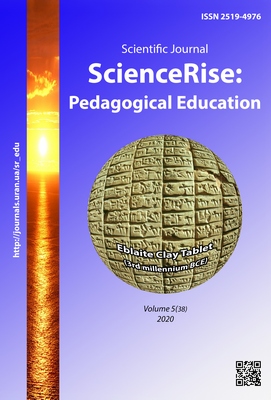Pedagogical conditions for the formation of eco-values of future teachers of natural sciences: a methodological approach
DOI:
https://doi.org/10.15587/2519-4984.2020.213390Keywords:
pedagogical theory, pedagogical conditions, axiology, ecological values, means of diagnostics of educational processAbstract
The urgency of forming an eco-focused type of understanding nature among modern people has a philosophical and theoretical justification and practical confirmation, related to the sad experience of environmental problems. In turn, this actualizes the task of introducing into the educational process pedagogical conditions, which would stimulate the formation of environmental values of specialists in the specialty 014.15 General Education (Natural Sciences) of the first (bachelor's) level of higher education. These specialists can be potential adherents of the eco-focused type of understanding nature. This task is even more relevant, considering the fact that the axiological component in modern educational programs of the relevant profile is not enough represented little, and the formation of environmental value competencies is not their goal.
The purpose of this study is to clarify the content of the methodological approach regarding verifying the effectiveness of the implementation of certain pedagogical conditions in order to obtain the desired educational result – the formation of environmental values in future teachers of natural sciences.
The research has generalized and systematized scientific methods, which allow determining the effectiveness of pedagogical conditions for the formation of environmental values through the implementation of the author’s course “Axiological Pedagogy” and training course “Ensuring the adoption and translation of professional values.” The paper presents for the first time a methodological research system that is justified for the analysis of the first systematized and substantiated environmental values as the desired results of the educational process. The article defines peculiarities of application of methods for diagnosing the formation of ecological values in future teachers of natural sciences.
The pilot test of the described methodological research system has proved its validity in pedagogical practice, in particular, to assess the results of the implementation of pedagogical conditions for the formation of environmental values of specialists in specialty 014.15 Secondary education (Natural Sciences) of the first (bachelor’s) level of higher education
References
- Lytvyn, A., Matseyko, O. (2013). Methodological Principles of the Notion of “Pedagogical Conditions”. Pedagogy and psychology of vocational education, 4, 43–63.
- Blashkova, O. M. (2019). Formuvannia humanistychnykh tsinnostei studentiv pryrodnychykh spetsialnostei u navchalno-vykhovnomu protsesi pedahohichnykh universytetiv. Kyiv, 227.
- Hrytsai, N. B. (2016). Systema metodychnoi pidhotovky maibutnikh uchyteliv biolohii v pedahohichnykh universytetakh. Poltava, 526.
- Vasylieva, M. P. (2004). Teoretychni osnovy deontolohichnoi pidhotovky pedahoha. Kharkiv, 38.
- Demianiuk, V. V. (2019). Formuvannia u maibutnikh spetsialistiv z bukhhalterskoho obliku tsinnisnykh profesiinykh oriientatsii u fakhovii pidhotovtsi. Rivne, 20.
- Molchaniuk, O. V. (2020). Teoretyko-metodolohichni zasady vykhovannia v maibutnikh uchyteliv biolohii tsinnisnoho stavlennia. Kyiv, 469.
- Schwartz, S. H. (1992). Universals in the Content and Structure of Values: Theoretical Advances and Empirical Tests in 20 Countries. Advances in Experimental Social Psychology. Vol. 25, 1–65. doi: http://doi.org/10.1016/s0065-2601(08)60281-6
- Rokeach, M. (1979). Understanding Human Values: individual and societal. New York: Free press, 322.
- Ladanov, I. D., Urazaeva, V. A. (2002). Diagnostika motivatsionnykh orientatsii v mezhlichnostnykh kommunikatsiiakh / Sotsialno-psikhologicheskaia diagnostika razvitiia lichnosti i malykh grupp. Moscow: Izd-vo Instituta Psikhoterapii, 92–94.
- Sull, D., Turconi, S., Sull, C. (2020). When It Comes to Culture, Does Your Company Walk the Talk? Management review. Available at: https://sloanreview.mit.edu/article/when-it-comes-to-culture-does-your-company-walk-the-talk/?fbclid=IwAR2hM0SJMFDwJS2DSgMSgTZMMKUIlx4r1wDVtMmIsISZ7cTyEJYn6lECs3g Last accessed: 18.09.2020
- Karandashev, V. N. (2004). Metodika Shvartsa dlia izucheniia tsennostei lichnosti: kontseptsiia i metodicheskoe rukovodstvo. Saint Petersburg: Rech, 70.
- Khrolenko, M. V. (2006). Formuvannia ekolohichnoi svidomosti maibutnikh vchyteliv pochatkovykh klasiv. Kyiv, 234.
- Greben, N. F. (2007). Psikhologicheskie testy dlia professionalov. Minsk: Sovremennaia shkola, 496.
- Petruk, V. H., Klymenko, M. O., Mudrak, O. V. (2011). Vstup do fakhu. Vinnytsia: UNIVERSUM-Vinnytsia, 203.
Downloads
Published
How to Cite
Issue
Section
License
Copyright (c) 2020 Valentin Rogoza

This work is licensed under a Creative Commons Attribution 4.0 International License.
Our journal abides by the Creative Commons CC BY copyright rights and permissions for open access journals.
Authors, who are published in this journal, agree to the following conditions:
1. The authors reserve the right to authorship of the work and pass the first publication right of this work to the journal under the terms of a Creative Commons CC BY, which allows others to freely distribute the published research with the obligatory reference to the authors of the original work and the first publication of the work in this journal.
2. The authors have the right to conclude separate supplement agreements that relate to non-exclusive work distribution in the form in which it has been published by the journal (for example, to upload the work to the online storage of the journal or publish it as part of a monograph), provided that the reference to the first publication of the work in this journal is included.








